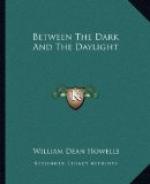If he turned to her father for counsel or instruction, or even a participation in his responsibility, he was met by an optimistic patience which exasperated him, if it did not complicate the case. Once, when Lanfear forbearingly tried to share with him his anxiety for the effect of a successful event, he was formed to be outright, and remind him, in so many words, that the girl’s restoration might be through anguish which he could not measure.
Gerald faltered aghast; then he said: “It mustn’t come to that; you mustn’t let it.”
“How do you expect me to prevent it?” Lanfear demanded, in his vexation.
Gerald caught his breath. “If she gets well, she will remember?”
“I don’t say that. It seems probable. Do you wish her being to remain bereft of one-half its powers?”
“Oh, how do I know what I want?” the poor man groaned. “I only know that I trust you entirely, Doctor Lanfear. Whatever you think best will be best and wisest, no matter what the outcome is.”
He got away from Lanfear with these hopeless words, and again Lanfear perceived that the case was left wholly to him. His consolation was the charm of the girl’s companionship, the delight of a nature knowing itself from moment to moment as if newly created. For her, as nearly as he could put the fact into words, the actual moment contained the past and the future as well as the present. When he saw in her the persistence of an exquisite personality independent of the means by which he realized his own continuous identity, he sometimes felt as if in the presence of some angel so long freed from earthly allegiance that it had left all record behind, as we leave here the records of our first years. If an echo of the past reached her, it was apt to be trivial and insignificant, like those unimportant experiences of our remotest childhood, which remain to us from a world outlived.




